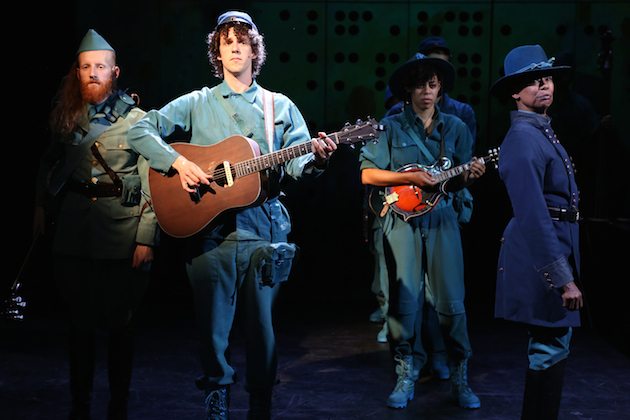

The future is a tricky thing. Though it always lies ahead, what was once the future has since become present and is now the past. But these tricky concepts lie at the heart of Futurity, a co-production by Soho Rep and Ars Nova currently playing at the Connelly Theater. Futurity collapses past, present, and future into a beautifully cerebral folk-rock spectacle.
With book and lyrics by César Alvarez and music by Alvarez with The Lisps, Futurity tells the imagined story of Julian Munro (Alvarez), a fictional Civil War soldier who dreams of peace, and Ada Lovelace (Sammy Tunis, also of The Lisps), an actual British mathematician considered to be the first computer programmer. Julian and Ada strike up a letter-writing relationship while Julian is in the trenches, resulting in the invention of a steam-powered computer (dubbed the “Steam Brain”) that could end war through the influence of its superior imagination.
There’s little plot or character development here, and the premise is mostly a vehicle for the dizzyingly intellectual songs. The score oscillates between homespun harmonies evoking 19th-century Americana and the contemporary folk-rock sound of The Lisps, featuring both quieter introspective moments and intense numbers that attack with a throbbing percussive beat. It’s somewhere between a musical and a concert, bound by character and plot but driven not so much by story as the performers’ collective musical force, from Alvarez and Tunis to an ensemble of soldiers toting musical instruments in lieu of weapons. The catchy and witty music is enjoyable beyond its heady subject matter, and together with the piece’s laid-back DIY feel (complete with free pre-show popcorn) and Sarah Benson’s clever direction, Futurity draws in even those who don’t want to decipher the intellectual concepts at its core. (As one audience member exclaimed at intermission: “I have no idea what’s going on, but I like it!”)
These larger ideas, though, are what take Futurity from being solely entertaining to fascinating. The Civil War backdrop and sci-fi themes bring up ideas about technology, the implications of our imaginations, and what the future is, while the war’s ties to slavery raise questions of the origin of thoughts and if war can actually be successful when the problem is the bigoted opinions lying underneath. If that all sounds hard to comprehend in a two-hour show—it is. Futurity crams tangles of massive ideas into a constrained music theatre form, and though the result is messy, its extreme ambition makes for theatre that keeps you thinking long past the curtain call.
But messiness makes sense in a show dealing with the future, which is messy and unresolved by nature. Furthermore, though the story focuses on a future conceived by the past, the future it imagines still feels in some ways like it’s ahead of us today. The show reminds us that “the story of the future is both past and present tense,” and Futurity blends its historical story with interstitials where Alvarez and Tunis (as themselves) improvise about how the performance is going, jutting us back into the present. Julian and Ada dream of a future where a computer could end the Civil War, but we’re still grappling today with bigotry, war, and the implications of our evolving technology. By focusing on the past while reminding us we’re in the present, Futurity lets us look toward the future.